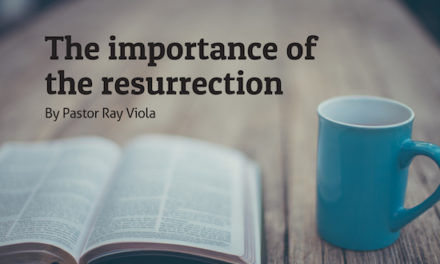Four times in Exodus 6:2-8 God stated to Moses, “I am the LORD”. The number four implies universality: four ‘corners’ of the earth, four points on a compass, four dimensions in the physical universe. In other words, by declaring who He is four times, God was ‘covering all the bases’ and emphasizing His identity. By the way, have you ever noticed how often God repeats Himself? It’s not because He’s senile and forgets He’s already said the same thing, but because in His wisdom He knows we rarely (if ever) ‘get it’ the first time! Repetition is often necessary to get our attention, and to ensure learning and understanding. So, if something keeps coming to your attention over and over again, take note of it, seek the Lord about it, and listen to what He may be trying to teach you.
Back in Exodus 6, the scenario was this: At God’s command Moses (age 80) was in Egypt to deliver the Jewish people from their bondage, but things had not started out well. “Moses returned to the LORD and said, ‘Lord, why have You brought trouble on this people? Why have You sent me? For since I came to Pharaoh to speak in Your name, he has done evil to this people; neither have You delivered Your people at all.’ ” (Exodus 5:22,23) You may recall that when God had first revealed Himself to Moses in the burning bush in the desert and gave him his assignment, He identified Himself to Moses as “I AM” (Exodus 3:14). “God also said to Moses, ‘Say this to the people of Israel, “The LORD, the God of your fathers, the God of Abraham, the God of Isaac, and the God of Jacob has sent me to you.” This is my name forever, and thus I am to be remembered throughout all generations.’ ” (Exodus 3:15) Thus, with Moses now on the battlefield in Egypt, God was probably re-establishing His identity to reassure him. In fact, the first time God said, “I am the LORD” in this encounter with Moses He went on to tell him: “I appeared to Abraham, to Isaac, and to Jacob as God Almighty, but by My name the LORD I did not make myself known to them.” (“God Almighty” in Hebrew is “El Shaddai”, while “LORD” is “Jehovah” [“Yahweh”] – from the root verb “hayah” meaning, “to exist, i.e. be”; thus the connection between “I AM” and “LORD”.)
Since God emphasized the revelation of His identity as “the LORD” to Moses and Israel, let’s take a detour here and go to Exodus 34 to find out more about this name. In one of his many conversations with God, Moses asked to see God’s glory (Exodus 33:18). God’s reply was: “I will make all My goodness pass before you, and I will proclaim the name of the LORD before you.” (Exodus 33:19) Here God equated His nature as the eternal “I AM” with His glory and goodness. But there’s much more! A short time later God stood with Moses “and proclaimed the name of the LORD” (Exodus 34:5); that is, He revealed His nature, His character to him. This is what God Himself says He is: “The LORD, the LORD, a compassionate and gracious God, slow to anger, abounding in lovingkindness and faithfulness, keeping mercy for thousands, forgiving iniquity, rebellion, and sin, by no means clearing (“the guilty” is usually inserted), visiting the iniquity of the fathers on the children and the children’s children to the third and fourth generation.” (Exodus 34:6-7) (Note: Moses’ response in verse 8 of humility and worship is the only possible reaction to a true revelation of the nature of God.) God told Moses (and tells us) that His inherent, eternal nature is of a benevolent and caring Supreme Being, One who freely bestows undeserved blessings, is long-suffering with mankind, and overflows with goodness and truthfulness. Furthermore, He does not give the punishment that is deserved “for thousands,” and the Hebrew here implies “generations”, meaning God’s steadfast love and mercy extends to each and every generation. And the LORD forgives ALL our innate sinfulness, deliberate and prideful independence, as well as our ignorance and inadequacies. Most people would probably have little problem relating to such a loving God, but the last part of verse 7 can be disconcerting. Many commentators see it as an assertion of God’s justice, righteousness, and holiness, and the Bible certainly teaches that. After all, it would not be ‘fair’ for the unrepentant to go unpunished for their wickedness; in fact, it would be impossible, because “the wages of sin is death, but the gift of God is eternal life in Christ Jesus our Lord.” (Romans 6:23). Only if and when sinners repent and humbly believe in God’s provision for them (through Christ), can God’s “mercy triumph over judgment.” (James 2:13) But does God really punish several generations of progeny for the sins of their predecessors? This would be contradicted by what God declared through Ezekiel in chapter 18. “The soul who sins shall die. The son shall not bear the guilt of the father, nor the father bear the guilt of the son. The righteousness of the righteous shall be upon himself, and the wickedness of the wicked shall be upon himself.” (Ezekiel 18:20; see also Jeremiah 31:29,30.) It also seems contrary to God’s inherent merciful nature, and we know God does not change. “For I the LORD do not change; therefore you are not consumed, O sons of Jacob.” (Malachi 3:6)
There are at least two possible explanations to this seeming paradox. One is found in another interpretation of the vocabulary. For example, the Hebrew word translated as “visiting” can have either a friendly or hostile connotation, and can be also be rendered, “caring for”. This could indicate God addressing the sinfulness the children learned from their ancestors with the intent to ransom them from it. (Peter referred to our redemption “from the futile ways inherited from your forefathers” – 1 Peter 1:18.) It is even possible that the last part of verse 7 is actually opposite to its real meaning, a turn of phrase that would make the true sense of the passage God forgiving the guilty (and we all are, for “all have sinned” – Romans 3:23), and extending this forgiveness to successive generations of offspring. This certainly seems more consistent with the rest of God’s revelation of His nature in this passage, and the fact that He is willing and able to forgive because of Christ’s sacrifice does not rule out or negate His righteous judgment and punishment against those who refuse to avail themselves of His forgiveness. So we could also look at this proclamation in Exodus 34:6-7 as a contrast between God’s dealings with the redeemed and the unrepentant (Deuteronomy 7:9-10). It is certainly true that there is a remnant of the righteous along with a majority of the wicked in every generation (Matthew 7:13,14).
Next month (Lord willing) we will return to Exodus 6 and continue to examine more of the treasures found there.






